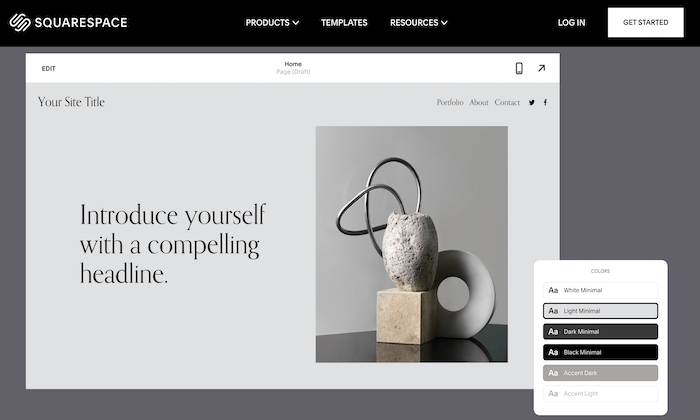
Best Content Management Systems
November 20, 2020
Disclosure: This content is reader-supported, which means if you click on some of our links that we may earn a commission.
A content management system—CMS for short—gives you the ability to publish content on the Internet.
These systems make it possible for everyday users to build websites and post content without having to write code or learn programming languages. Without a CMS, you’d have to write web pages using JavaScript, CSS, and HTML.
There are tons of different content management systems available on the market today. So naming just one as the definitive “best overall” option is impractical.
With that said, there are definitely CMS platforms that are better than others, depending on your specific use cases and unique scenarios. This guide will help you choose the best content management system for your website.
Here are my top picks:
The Top 6 Options For Content Management Systems WixShopifyWordPressDrupalSquarespaceTYPO3 How to Choose the Best Content Management System For YouThere are specific elements that you need to consider as you’re shopping around and evaluating various CMS platforms. Use the following factors as a buying guide to help narrow down your options and choose the best option for your site:
UsabilityThe primary factor that you need to consider is the usability of a CMS. What will you be using it for? Who specifically will be using it?
Marketers and writers might be creating the content, but those people may not have the skills to manage it online, format it, and write lines of code. If this sounds like your scenario, make sure the CMS is easy enough for non-technical users to manage.
Look for solutions with a WYSIWYG (what you see is what you get) editor, drag-and-drop building tools, simple publishing features, and the ability to embed third-party content or add rich media.
The type of website you’re creating will also fall into this category. For example, blogs, ecommerce sites, and portfolio sites won’t have the same needs.
SecuritySecurity should always be a top concern when you’re looking at CMS software.
Some platforms will have built-in safeguards and security features to fight off malicious attacks and hackers. Other tools rely on third-party plugins and extensions for security. Generally speaking, popular and open-source CMS platforms are more vulnerable to attacks. You’ll have to install your own security plugins to adequately keep your site safe.
But these platforms typically have an extensive marketplace with a plethora of plugins—so it shouldn’t be too difficult, even though it requires an extra step.
SEOThe best content management systems will come standard with features and tools to boost your SEO efforts.
Examples include XML site maps, meta descriptions, custom permalink structures, alt text, title tags, etc. In addition to these out-of-the-box SEO features, you should consider using CMS software that will let you add third-party plugins or extensions to better serve and enhance your SEO strategy.
SupportFind out what type of technical support is provided by the CMS platform you’re using.
What happens if you have a question, run into a problem, or need help? Will you be stuck to figure it out on your own? Or can you seek assistance from a support agent?
If you’re using an open-source CMS, you probably won’t have the luxury of dedicated support. You’ll have to rely on tutorials, self-help articles, and forums. But if you’re using a site builder or SaaS CMS, you can usually expect 24/7 support.
Custom CapabilitiesSome CMS software will restrict what you can do with your website.
For many people, this is a non-issue. But for those of you looking for complete customization with no restrictions, you’ll have to go with an open-source CMS system.
These platforms let you customize everything using the HTML code of your site. So it’s a great choice for developers and tech-savvy users. With that said, even non-technical users can benefit from customization by leveraging third-party plugins or extensions.
If you can’t find a custom function from a feature marketplace, you’ll need to have a developer build one for you. Make sure your CMS is compatible with this level of customization if you plan to go this route.
The Different Types of Content Management SystemsCMS platforms come in all different shapes and sizes. Before we dive into the reviews for my top picks, I want to quickly explain the different options you’ll come across as you’re shopping around. Understanding the differences between these systems will make it much easier to find the best CMS for your website.
Open Source CMSAn open-source content management system can be for any purpose. Anyone can use these without a license. These platforms can be fully customized without the need to request special permission.
An open-source CMS will be cheaper than other platforms that require subscriptions. Developers and users who want full custom capabilities without restrictions will benefit from using an open-source CMS.
It’s usually fairly easy to optimize your content for search engines with open source CMS platforms. Adding plugins and other extensions to extend the functionality is fairly simple as well.
Website BuildersSite builders are great for beginners. They make it possible for non-technical users to build a website without writing code or dealing with the backend requirements.
These will usually have drag-and-drop or WYSIWYG editors.
Website builders are easy to use and allow you to publish content quickly on the web. But they are a bit restrictive in terms of what you can customize. You’ll eventually run into limitations with site builders.
For many people, that’s fine. If you don’t need to create anything complex, a website builder should be more than suitable for your needs.
Ecommerce PlatformsAs the name implies, ecommerce CMS platforms are built specifically for online stores.
These platforms come out of the box with everything you need to manage your ecommerce content. You can still run an online store using an open-source CMS or website builder with ecommerce capabilities. However, if you’re starting a new ecommerce site from scratch and don’t want to do a ton of heavy-lifting, look for an ecommerce-specific CMS.
Proprietary CMSA proprietary CMS will require a license to use.
In short, this means that someone else owns the rights that CMS. You’ll need their permission to use it. Even if you obtain a license, you probably won’t be able to duplicate the CMS. You might also encounter restrictions related to what you can customize and alter within that license. Some proprietary CMS platforms will offer developer licenses for these scenarios.
If you’re using a proprietary CMS to build your website and decide to move it somewhere else down the road, you could run into some serious problems. Some sites only work if they stay within the proprietary CMS that they were built with. So use caution if you go this route.
SaaS CMSSaaS (software as a service) CMS are typically cloud-hosted subscription-based tools. Many of these tools come with CMS, tech support, and web hosting, all from a single provider.
The rates are usually offered on a per-site or per-user basis. Pricing is also based on storage levels, bandwidth, and support level. These systems can be offered as fully managed or partially managed solutions. The best option for you will depend on if you want to manage updates, security, backups, and other customizations on your own.
#1 – Wix Review — The Best CMS For Building New WebsitesWix is one of the easiest website builders available on the market today. Its simplicity makes it a popular choice for non-technical users who want to create a website from scratch.
I like Wix because it offers an intuitive drag-and-drop building tool. So you can add elements to your site and manage your content without writing a single line of code.

Aside from Wix being an excellent choice for beginners, here’s a quick overview of the other highlights that make this CMS stand out from the crowd:
500+ free templatesOptimized for SEO and mobileCreate password protected membership pagesContact management tools for subscriber listsEcommerce capability with product pages, payment acceptance, and store managementBookings and calendar managementBlog management tools with multiple writers and contributorsPhotography, video, and media management toolsFree hosting and free SSL certificateOverall, Wix’s content management system is extremely versatile. It’s trusted by restaurants, musicians, online stores, small businesses, bloggers, and sites in virtually every industry.
The platform is free to use with a Wix subdomain, but that’s not really practical for most users. Premium plans start at just $14 per month.
#2 – Shopify Review — The Best CMS For Ecommerce SitesIf you’re starting an online store and need an ecommerce-specific CMS, look no further than Shopify.
Businesses of all shapes and sizes have been using Shopify to sell online. Whether you’re building a new site from scratch or switching from your existing CMS, Shopify can accommodate your needs.

Let’s take a closer look and see why Shopify’s CMS platform ranks so high on my list:
Manage products and sell from your site, social media, and online marketplacesBuilt-in marketing toolsSimple dashboard to manage products, orders, payments, and shipping4,100+ apps to add features and functionality to your siteFree SSL certificateUnlimited products24/7 supportShopify even has a marketplace of experts for hire. So if you need assistance with SEO or getting your store setup, you can find a qualified expert directly within the platform.
Another reason to consider Shopify as your CMS platform is because it’s built to scale. Plans start at $29 per month, and you can try it free for 14 days.
#3 – WordPress Review — The World’s Most Popular CMSWordPress powers 38% of the Internet, making it the most popular content management system on the planet.
The platform supports everything from small personal blogs to some of the biggest news websites in the world.

As a free and open-source CMS, WordPress is virtually limitless. You’ll have total control over every aspect of your site, with no restrictions on customizations. This makes WordPress a popular choice for developers and tech-savvy users.
But even non-technical users can take advantage of WordPress. It has an extensive library of 57,000+ plugins, which makes it easy to add functionality to your site.
Other top features include:
Fully customizable designsMobile responsive contentSEO friendlyPowerful media management toolsHigh performance and easy to accessThe downside of using a free and open-source CMS is that you don’t have dedicated support. But WordPress has an extensive network of developers, content creators, and site owners who are active on community forums.
You’ll also have to get your web hosting plan and domain registration on your own from third-parties.
#4 – Drupal Review — The Best WordPress Alternative CMSDrupal is another free and open-source content management system.
If you need multiple page templates and content types, Drupal is a viable alternative to WordPress. It’s also more equipped to handle advanced user permissions.

Drupal is a popular choice for developers, marketers, and agencies alike. It’s used to manage content across a wide range of industries, including healthcare, ecommerce, retail, FinTech, travel, media, government, and more.
Some of the top features and noteworthy highlights include:
Content authoringContent as a serviceMarketing automationRobust securityHigh performance, scalability, and accessibilityAdvanced personalizationsSo if you’re looking for open-source functionality but don’t like WordPress, I’d go with Drupal for content management.
#5 – Squarespace Review — Best CMS For Creative ProfessionalsSquarespace is an all-in-one website builder. But unlike other similar CMS platforms on the market, Squarespace has a unique differentiator—beautiful designs.
The award-winning templates offered by Squarespace are second to none. These can be fully customized to fit your site’s needs.

These modern designs make Squarespace a popular content management choice for creative professionals, musicians, artists, and portfolio sites. Let’s take a closer look at some of the other noteworthy highlights available with this CMS:
Free domain for the first yearIntuitive website builderFree logo making toolEcommerce and blogging capabilitiesThird-party extensions for expanding functionalityBuilt-in marketing toolsSEO tools and mobile optimized24/7 customer supportSquarespace plans start at $12 per month. If you’re looking for a simple way to manage your portfolio site, this will be a top content management system to consider.
#6 – TYPO3 Review — The Best Enterprise CMSTYPO3 isn’t the most well-recognized name in the CMS space. But it’s not for everyone.
It’s another free and open-source platform (like WordPress and Drupal), but it’s branded as an “enterprise-class CMS.” Global leaders like Mercedes-Benz and Sony rely on TYPO3 for content management.

In addition to being used by large corporations, TYPO3 is actually a popular choice for European-based websites. Here are some of the reasons why this CMS platform made my list:
Ability to support corporate environmentsFully scalable multi-site managementMultilingual installationsEasy to set up on your existing infrastructureHigh speed and performanceThe average user will likely lean towards WordPress or Drupal. But global organizations with complex content management needs should consider an alternative like TYPO3.
SummaryWith so many CMS systems available on the market today, there are really only six that I can recommend with conviction.
Personally, I use WordPress. But there are plenty of other viable options to consider based on your personal needs.
Just refer to the buying guide and reviews outlined in this post to find the best content management system for you.
The post Best Content Management Systems appeared first on Neil Patel.
Read more: neilpatel.com
A quick note about the reviews I do on this site. The product vendors may give me access to their products for free in order for me to do my review, alternatively, I may have bought the product myself. However I make no promises to vendors regarding what I write in my review. Should you click a link that takes you to a sales page for a paid product for sale this link will be an affiliate link and I will be paid a percentage of the sales price should you decide to invest in it.




